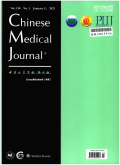Targeted inhibition of myeloid-derived suppressor cells in the tumor microenvironment by low-dose doxorubicin to improve immune efficacy in murine neuroblastoma
Targeted inhibition of myeloid-derived suppressor cells in the tumor microenvironment by low-dose doxorubicin to improve immune efficacy in murine neuroblastoma
摘要Background::High agglomeration of myeloid-derived suppressor cells (MDSCs) in neuroblastoma (NB) impeded therapeutic effects. This study aimed to investigate the role and mechanism of targeted inhibition of MDSCs by low-dose doxorubicin (DOX) to enhance immune efficacy in NB.Methods::Bagg albino (BALB/c) mice were used as tumor-bearing mouse models by injecting Neuro-2a cells, and MDSCs were eliminated by DOX or dopamine (DA) administration. Tumor-bearing mice were randomly divided into 2.5 mg/kg DOX, 5.0 mg/kg DOX, 50.0 mg/kg DA, and control groups ( n = 20). The optimal drug and its concentration for MDSC inhibition were selected according to tumor inhibition. NB antigen-specific cytotoxic T cells (CTLs) were prepared. Tumor-bearing mice were randomly divided into DOX, CTL, anti-ganglioside (GD2), DOX+CTL, DOX+anti-GD2, and control groups. Following low-dose DOX administration, immunotherapy was applied. The levels of human leukocyte antigen (HLA)-I, CD8, interleukin (IL)-2 and interferon (IFN)-γ in peripheral blood, CTLs, T-helper 1 (Thl)/Th2 cytokines, perforin, granzyme and tumor growth were compared among the groups. The Wilcoxon two-sample test and repeated-measures analysis of variance were used to analyze results. Results::The slowest tumor growth ( F = 6.095, P = 0.018) and strongest MDSC inhibition ( F = 14.632, P = 0.001) were observed in 2.5 mg/kg DOX group. Proliferation of T cells was increased ( F = 448.721, P < 0.001) and then decreased ( F = 2.047, P = 0.186). After low-dose DOX administration, HLA-I ( F = 222.489), CD8 ( F = 271.686), Thl/Th2 cytokines, CD4 + and CD8 + lymphocytes, granzyme ( F = 2376.475) and perforin ( F = 488.531) in tumor, IL-2 ( F = 62.951) and IFN-γ ( F = 240.709) in peripheral blood of each immunotherapy group were all higher compared with the control group (all of P values < 0.05). The most significant increases in the aforementioned indexes and the most notable tumor growth inhibition were observed in DOX+anti-GD2 and DOX+CTL groups. Conclusions::Low-dose DOX can be used as a potent immunomodulatory agent that selectively impairs MDSC-induced immunosuppression, thereby fostering immune efficacy in NB.
更多相关知识
abstractsBackground::High agglomeration of myeloid-derived suppressor cells (MDSCs) in neuroblastoma (NB) impeded therapeutic effects. This study aimed to investigate the role and mechanism of targeted inhibition of MDSCs by low-dose doxorubicin (DOX) to enhance immune efficacy in NB.Methods::Bagg albino (BALB/c) mice were used as tumor-bearing mouse models by injecting Neuro-2a cells, and MDSCs were eliminated by DOX or dopamine (DA) administration. Tumor-bearing mice were randomly divided into 2.5 mg/kg DOX, 5.0 mg/kg DOX, 50.0 mg/kg DA, and control groups ( n = 20). The optimal drug and its concentration for MDSC inhibition were selected according to tumor inhibition. NB antigen-specific cytotoxic T cells (CTLs) were prepared. Tumor-bearing mice were randomly divided into DOX, CTL, anti-ganglioside (GD2), DOX+CTL, DOX+anti-GD2, and control groups. Following low-dose DOX administration, immunotherapy was applied. The levels of human leukocyte antigen (HLA)-I, CD8, interleukin (IL)-2 and interferon (IFN)-γ in peripheral blood, CTLs, T-helper 1 (Thl)/Th2 cytokines, perforin, granzyme and tumor growth were compared among the groups. The Wilcoxon two-sample test and repeated-measures analysis of variance were used to analyze results. Results::The slowest tumor growth ( F = 6.095, P = 0.018) and strongest MDSC inhibition ( F = 14.632, P = 0.001) were observed in 2.5 mg/kg DOX group. Proliferation of T cells was increased ( F = 448.721, P < 0.001) and then decreased ( F = 2.047, P = 0.186). After low-dose DOX administration, HLA-I ( F = 222.489), CD8 ( F = 271.686), Thl/Th2 cytokines, CD4 + and CD8 + lymphocytes, granzyme ( F = 2376.475) and perforin ( F = 488.531) in tumor, IL-2 ( F = 62.951) and IFN-γ ( F = 240.709) in peripheral blood of each immunotherapy group were all higher compared with the control group (all of P values < 0.05). The most significant increases in the aforementioned indexes and the most notable tumor growth inhibition were observed in DOX+anti-GD2 and DOX+CTL groups. Conclusions::Low-dose DOX can be used as a potent immunomodulatory agent that selectively impairs MDSC-induced immunosuppression, thereby fostering immune efficacy in NB.
More相关知识
- 浏览0
- 被引1
- 下载0


相似文献
- 中文期刊
- 外文期刊
- 学位论文
- 会议论文



 换一批
换一批 换一批
换一批



